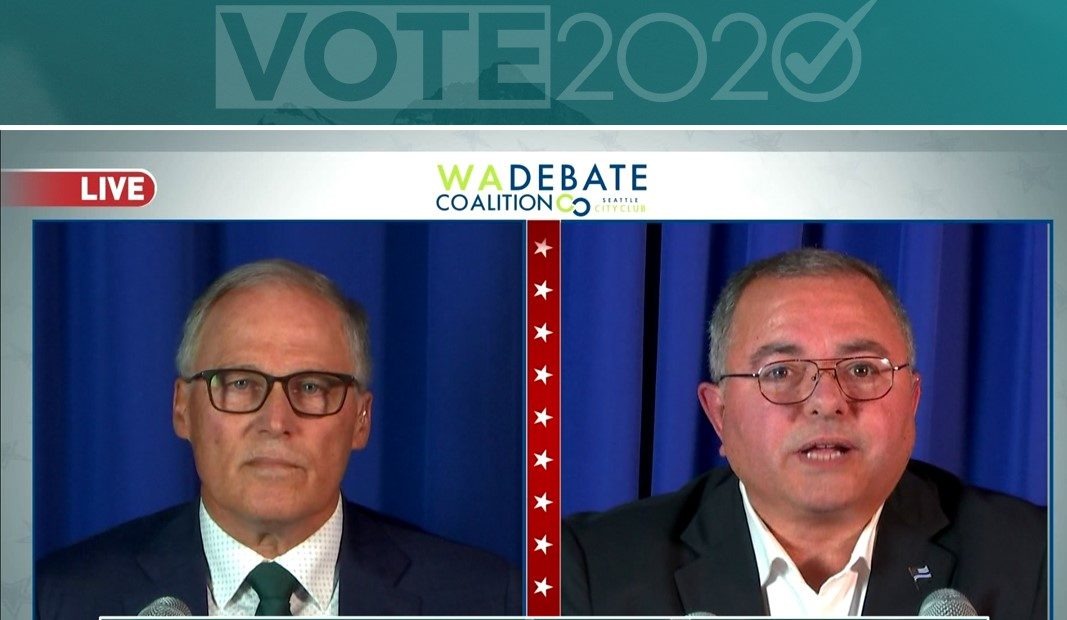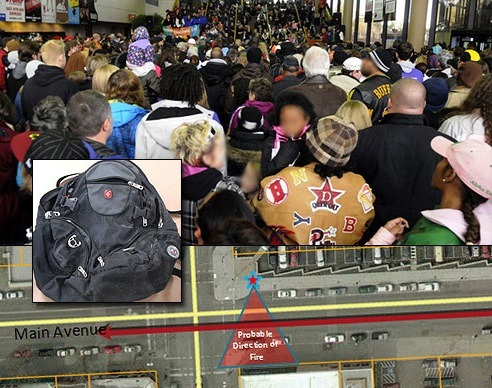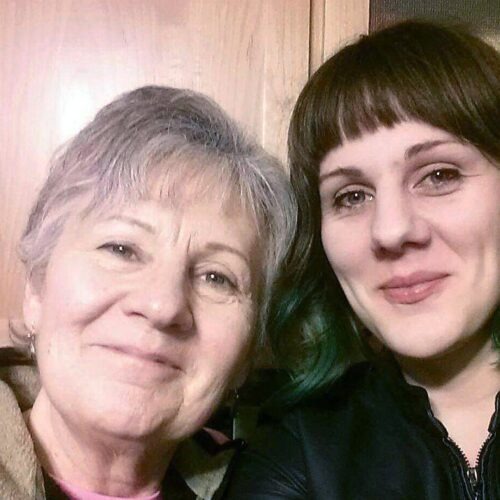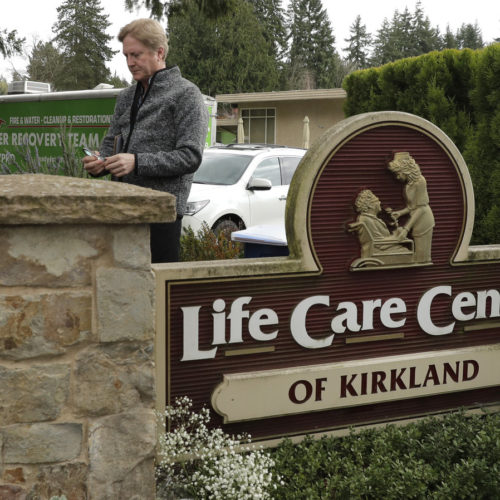
Dynamics Of Washington’s 2020 Election: Governor’s Race, State Legislature Looks Mostly The Same
WATCH
The Washington state legislature is shaping up to be … pretty much how it looked before the election – with Democrats in control of both houses. But not with super-majorities.
While Republicans don’t have votes to stop legislation, they still play a role in how they work with majority Democrats to get legislation passed that helps their constituents.
“This is a case of, for the Republicans, do they play the role of the loyal opposition and or do they look for opportunities to work with Democrats on certain pieces of legislation,” Olympia correspondent Austin Jenkins said on a recent episode of NWPB’s Uniquely NW News. “What I often say is that the legislature’s an 80-20 proposition: 80% of what they do is fairly bipartisan, and it’s not uncommon to see unanimous votes for legislation. It’s the 20% where you really see the philosophical differences between the parties reveal themselves and the differences and the split votes.”
What that means: Republicans are not in a power position in Washington.
“Their votes are often or sometimes needed if you need 60% to approve bonds. But generally, they’re kind of in a position and in a decision-making mode of when do they wanna play and be part of the policy making, and when do they think they need to stand up and, while they won’t be able to stop stuff, necessarily, be the voice of opposition,” Jenkins said.
If anything, Washington’s legislative districts are becoming more Democratic or more Republican without many close races. That’s especially true in eastern Washington, where most districts are solidly Republican. Coming into the 2020 election, only three seats in legislative districts east of the Cascades were held by Democrats. And those are all in one district – the 3rd, which represents the most urban part of Spokane. It looks like that will still be the case after this election.
Watch the full episode above. See more from NWPB’s Uniquely NW News and all NWPB videos on YouTube.
CONVERSATION HIGHLIGHTS:
(Edited for length and clarity)
On whether the race for governor ended up pretty much how he expected:
Yeah, it is because you’ve got a well-known governor, a Democrat, in a state that leans Democrat, up against a first-time candidate in Loren Culp who was not well known. Just looking at the split, it’s essentially a 60-40 race. (NOTE: More ballots have been counted since this was recorded.) On the one hand, you could see that as a blowout. You could also say to yourself, “Well, for a guy who wasn’t well known and hadn’t ever run before, Loren Culp is getting about 40, more than 40% of the vote.” So maybe that’s not a bad performance, at least where he was starting out. And really, what’s interesting to note … But he’s really only about four points off of where Bill Bryant was four years ago. Bill Bryant was the Republican candidate for governor in 2016.
On what elections officials would say in response to Loren Culp claiming “irregularities” in the election process:
Let’s contrast that with the fact that the Associated Press called this race almost the moment the polls closed or eight o’clock rolled around. So it was, from their perspective, a very definitive race, and a 60-40 split is seen be a miracle to somehow close that gap, even if, and I think we expect this, the later arriving votes to benefit a Republican candidates ’cause there’s a sense that Democrats voted early this year. But yeah, he’s making very vague references to something looking fishy or seeming fishy about this, even using the word corruption. There’s no evidence of that. The governor yesterday or this week said that he thought that that was very irresponsible talk. The secretary of state, Kim Wyman, a Republican, said, “There’s no evidence of irregularities.” And again, Culp hasn’t been specific about this, but he has said is he wants to let all the votes be counted, and I think that that’s a defensible position.
On Loren Culp’s job in Republic as police chief and sole law enforcement officer for the town in Ferry County:
A one-two punch for Loren Culp not winning the governor’s race and then losing his job, and he announced this to supporters in a Facebook Live appearance. Turns out, I guess, that the city council, at the end of October, voted, as you say, to eliminate the police department. And since he is the police department, the chief and the sole officer, eliminate his position. He says he had taken a leave of absence, and the local sheriff’s office was back filling. Now it looks like the city is contracting him at the sheriff’s office going forward for law enforcement, and Culp is out of a job. I did see some reporting that suggests perhaps he would be able to lateral over into the sheriff’s office there. He didn’t reference that. He described it as a knife in the back. He said that the timing was suspicious. He urged his supporters to call and complain to the city of Republic. He did not appear to be taking this well. He said he got really no notification and no thanks for your service, but instead, again, to use his language, “it felt like a knife in the back.”
(NOTE: The Ferry County Sheriff’s Office is headquartered in the small town of Republic, which is the largest town in the county – with about 1,000 people. It’s not uncommon for sheriff’s departments to provide policing services in smaller towns in those counties because the cities don’t have the budget for their own police departments.)
On Washington Secretary of State Kim Wyman being the only statewide elected Republican after this race and whether it’s increasingly hard for them to win statewide offices due to the voting numbers in the Puget Sound region:
I believe she may be the only statewide Republican left standing on the entire West Coast here in the lower 48 when all is said and done because of Oregon voters apparently electing a Democrat to the secretary of state’s office in that state. So yes, I think that Republicans are an endangered species when it comes to statewide office here, and part of what happened this year is because Inslee was running for a third term and it wasn’t an open seat, that was a disincentive for some better-known Republicans to jump into the race. Somebody that comes to mind would be Pierce County executive Bruce Dammeier, who has often been talked about as a potential candidate for higher office, even House Republican leader JT Wilcox. So next time there’s an open seat, I think we might see more competitive Republicans get into this, but the problem Republicans have right now is that they don’t really seem to have a path to win unless they can inspire ticket splitting, which is what Kim Wyman seems to be doing. They’ve lost the suburbs around King County, and, really, the Puget Sound suburbs. They are gaining some traction out on the coast, but they’re not making inroads with the voters that used to help them get elected to statewide office. And whether they can retool as a party and put forth a candidate that can appeal more broadly really remains to be seen. It’s pointed out to me that Republicans win in states like Massachusetts, but that’s also a different dynamic. It’s a different voter population. Republicans really haven’t been able to figure out a way to win back the governor’s office, and we’re going on four decades here.
On the 2020 legislative races to watch:
I think Democrats will probably be up a little bit, maybe a seat in the Senate, maybe a couple of seats in the House. We’re just gonna have to see where things land ’cause there are some super close races. But a couple of places that I’m watching that I think are interesting. Democrats may be able to flip a seat down in Clark County in southwest Washington this time around, and that’s interesting just because that is a fast-growing area. It has been fairly favorable and friendly to Republicans, although not exclusively, but that could be a sign of things changing down there, a harbinger, just something to watch. I mentioned a minute ago the coastal Washington, southwest coastal Washington, the 19th District, where it appears that two incumbent Democrats, a state senator and a state House member, have been washed out to sea, so to speak, by a real switch there, a move, a shift to Republicans that we started to see four years ago, so a blue-collar, more rural environment that long went for Democrats but now is becoming much more red.
On the position of legislative Republicans, particularly in eastern Washington:
With 49 legislative districts, I think before the election, only six of them were divided districts where you had a combination of Democrats and Republicans. So just as the country is very polarized, so is our state, and we may be electing Democrats statewide because of where the numbers are, central Puget Sound. But we’ve got very blue districts and very red districts, and a lot of those red districts are east of the mountains. And if anything, they’re getting more Republican, not less Republican. If Democrats make some gains in terms of seats in the legislature, that obviously diminishes the role of Republicans. So this is a case of, for the Republicans, do they play the role of the loyal opposition and or do they look for opportunities to work with Democrats on certain pieces of legislation? What I often say is that the legislature’s an 80-20 proposition. 80% of what they do is fairly bipartisan, and it’s uncommon to see unanimous votes for legislation. It’s the 20% where you really see the philosophical differences between the parties reveal themselves and the differences and the split votes. So Republicans are not in a power position. Their votes are often or sometimes needed if you need 60% to approve bonds or 2/3 for some reason. Tapping into the rainy day fund, for instance, may take Republican votes. I think that there’s some triggers around what’s going on with the economy. But generally, they’re in a position and in a decision-making mode of when do they wanna play and be part of the policy making, and when do they think they need to stand up and, while they won’t be able to stop stuff, necessarily, be the voice of opposition?
On the issues to look forward to coming into the 2021 legislative session with COVID so top-of-mind:
There will be anything but a normal session because much of it will be remote, and some of the details are still being figured out and even being announced this week. So yes, obviously, the budget shortfall is gonna be top of mind, continuing to address the COVID crisis, and the economic fallout. I can imagine that they’ll be looking to spend money in the capital construction budget with the idea of generating some jobs and trying to get some money into the economy. Police reform. With Democrats in charge, the governor and Democrat leaders in the legislature signal that will be a top priority, so we can expect to see a package of police reform measures. I do think that because of COVID and because of remote sessions, this may reduce the volume of bills that get through. I say that now. Maybe I’ll be surprised later because the trend line has been more bills, more stuff passing, especially with one party rule. But this may slow things down a little bit, and it may force Democrats to really figure out what their priorities are when they’re trying to do legislation and less than legislating in less than ideal circumstances because of the pandemic.
Related Stories:

10 Years After White Supremacist Tried To Bomb Spokane’s MLK Parade, Extremism Is More Mainstream
This week marks 10 years since a white supremacist attempted to bomb the Martin Luther King Junior Day parade through downtown Spokane. The bomb was discovered and defused just in the nick of time. But the effects of extremist ideologies in the region lived on. Journalist Leah Sottile examined that in the podcast Bundyville, from Oregon Public Broadcasting. Leah spoke with Scott Leadingham in August 2019 about the podcast’s second season and the anti-government movement in the region.

Yakima Journalist Who Lost Her Mom To COVID: Don’t Let Gatherings This Season Take Yours
Emily McCarty is a Yakima-based reporter for Crosscut/KCTS. Her mom, Mary, died in a Spokane hospital in November, four days after being diagnosed with COVID-19. McCarty wrote about her mom and her family’s personal experience in an essay titled “I lost my mom to COVID-19. Don’t let the holidays steal yours.”

COVID First Hit Long-Term Care In Puget Sound Region. Now It’s Hitting Home In Rural Areas
Some of the hardest hit places have been long-term care facilities in rural areas like Tonasket in Okanogan County, and in central Washington. At least three care facilities in Grant County have reported outbreaks and deaths since a large wedding near Ritzville last month attended by some care facility staff who later tested positive for COVID-19. But a definitive connection between those outbreaks and the wedding remains unclear.















